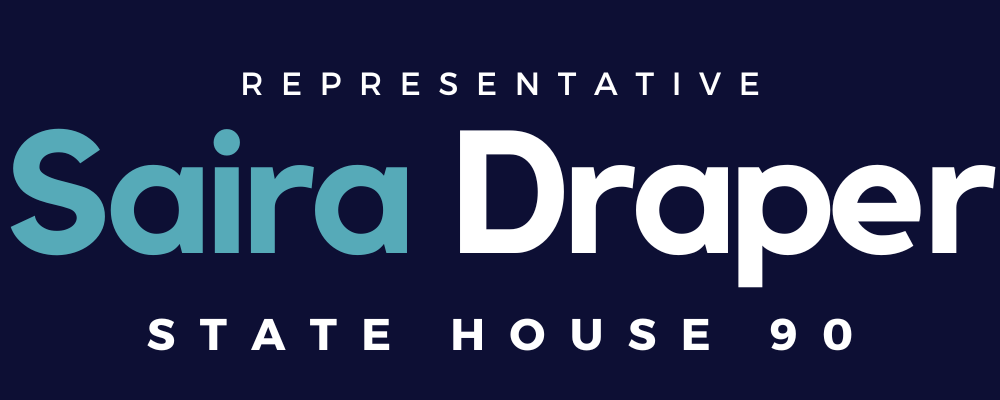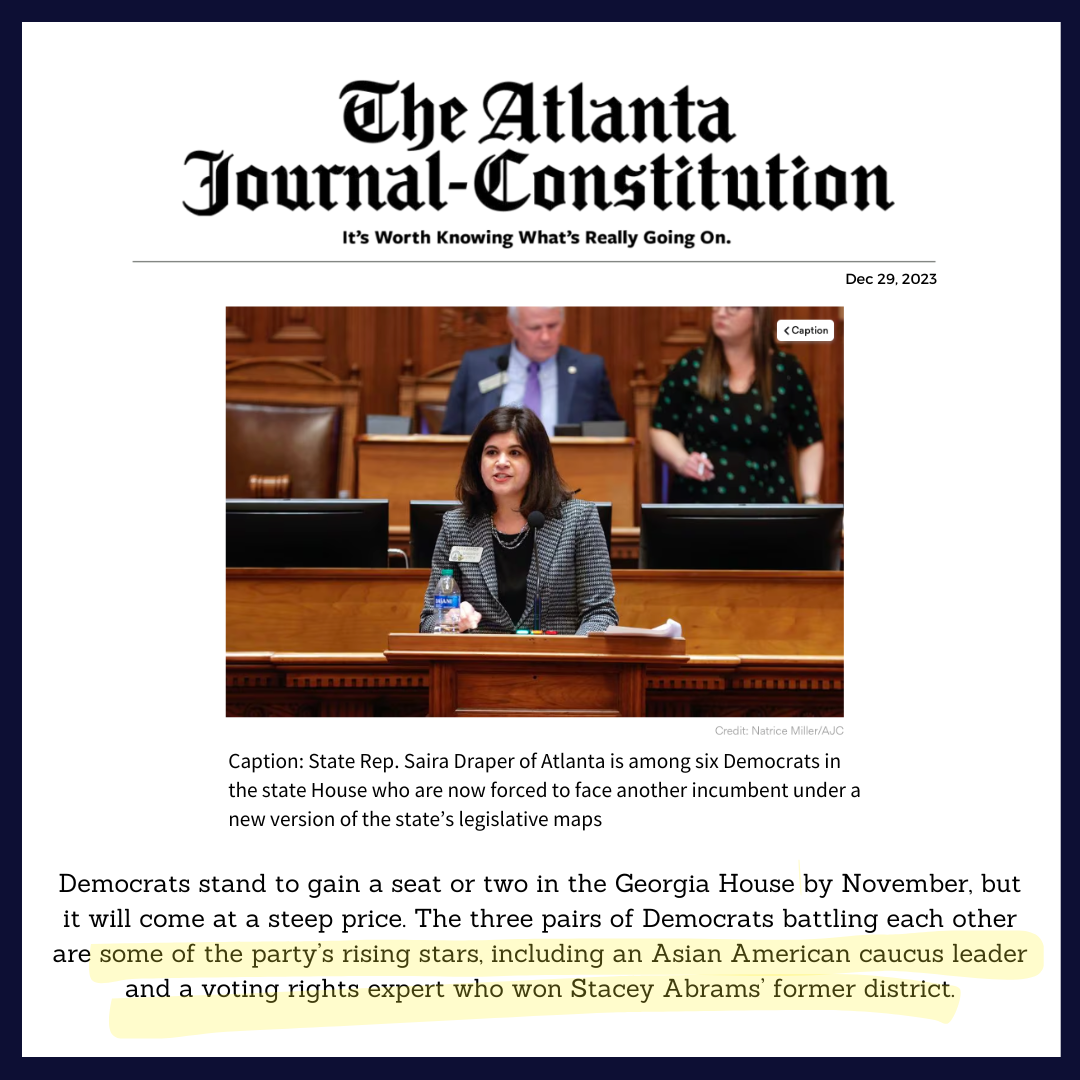Redistricting Recap Part 2: New Year, New Maps
Also, Changes in HD 90
January 1, 2024
Happy New Year!
May 2024 bring you success, happiness, and many cherished moments!
In my first Redistricting Recap, I shared that plaintiff voting rights advocates objected to the maps passed during the Special Session earlier this month, hoping to get them tossed. On 12/28, we got the court’s decision: All three maps– the state house, state senate, and Congressional maps– will stand for now. Even though plaintiffs may choose to appeal the court’s decision, as a practical matter, the Republican-drawn maps passed during the 2023 Special Session will be the maps Georgia uses for the 2024 election cycle.
It’s a very disappointing result for reasons I delve into below. However, I wasn’t so surprised given the judge’s comments at a hearing a couple weeks ago. Judge Jones clearly wanted to narrow the issues in the case as much as possible, especially given that the 2024 election cycle is quickly approaching. This fact greatly played to the state’s advantage.
There’s lots to cover in this edition of the Draper Paper.
The changes to HD 90.
Thoughts on the 12/28 court decision
My re-election campaign.
Hearing on Maternal Mortality this Thursday, Jan 4.
Reps. Omari Crawford, El-Mahdi Holly, and I invite you to march with us on MLK Jr Day, Jan 15. Register here.
Changes to House District 90
Under the new maps, most of House District 90 remains the same– 70% of it, in fact. But we will lose a few precincts to other districts, and we gain a few new precincts too.
If you live in a precinct highlighted in teal, a warm, warm welcome to HD 90! This includes the other half of Candler Park, and parts of Druid Hills, Virginia Highlands (DeKalb), Morningside (DeKalb), and Panthersville- including South DeKalb mall. If I can be of any help, please don’t hesitate to reach out!
If you live in a precinct highlighted in pink, you will leave HD 90 in 2024. I’ve developed deep, wonderful relationships in the southern part of Cedar Grove, Terry Mill, and Kirkwood. That will not change just because there are new boundaries in our district. I am here to serve you for as long as I remain your representative in the Georgia House, and even after the new maps go into effect. And you will be in wonderful hands with Rep. Crawford (Kirkwood, Terry Mill) and Rep. Holly (south portion of Cedar Grove), who will represent you under the new maps. Sign up to meet them both at the DeKalb NAACP MLK parade on Jan 15!
Changes to House District 90
Some thoughts on the court’s map decision
Judge Jones gave voting rights advocates a big fat NOPE with his decision to allow the Republican-drawn 2023 maps to stand. The advocates wanted the new maps thrown out for not remedying the injuries created by the 2021 maps, but the judge sided with the state and said Georgia sufficiently complied with his instructions in creating the new maps.
What were those instructions, exactly? The new maps had to create one additional Black majority congressional district, and seven additional Black majority state legislative districts. But a central question that arose after the new maps were revealed was whether the new Black majority districts could be created at the expense of other minority-majority districts– because that’s exactly what happened. The most obvious example is Congresswoman McBath’s congressional district, a district where the majority was composed of Hispanic, Asian and Black voters; it was dismantled under the new maps and converted into a Black majority district.
Two pieces of evidence suggested the answer– to whether Black majority districts could be created at the expense of minority-majority districts- was no: First, that the Eleventh Circuit has held that coalition districts (where more than one protected minority group combine to form a majority in a district) are protected under the Voting Rights Act. And second, Judge Jones said in his instructions that “The State cannot remedy the Section 2 violations described herein by eliminating minority opportunity districts elsewhere in the plans.” At the hearing, there was a lot of discussion about what the court meant when it said “minority opportunity districts”– was it talking about minority and coalition districts, as plaintiffs argued, or was it talking about Black majority districts specifically, as the State argued?
In the end, the judge got to his decision by taking a very narrow view of what the State had to do to fulfill its compliance obligations– the judge found that simply creating the new Black majority districts was sufficient for now. Whether dismantling coalition districts was a Voting Rights Act Violation was a question for another day, given the time restraints.
At several points during the hearing, the judge reminded the parties it took 22 months to determine the 2021 maps violated the VRA. With the 2024 election cycle around the corner, there wasn’t enough time at the remedial stage of trial to decide whether the 2023 maps also violated the VRA.
That doesn’t sit right with me. It’s not fair to voters to replace one illegal map with another map that is potentially illegal in another way. But there was a lot of pressure around finalizing the maps. Timing is part of the reason voting rights cases are so tough– there’s always another election around the bend.
Voting rights cases can be like games of voter suppression whack-a-mole, where new potential violations pop up easily and often. But that’s where the comparison ends- because defeating a violation is not as easy or as quick as a swift whack on the head. Rather, proving a voting rights violation can take years in court, and requires much localized, fact intensive inquiry. This greatly benefits the defense, as it did in this case.
The solution, of course, is to ensure maps are legal before they are implemented, rather than having to wait until after implementation to sue. The Voting Rights Act used to have a preclearance requirement where certain states, including Georgia, had to have the federal government sign off on any changes to maps before they were implemented. But, in 2013, the Supreme Court in Shelby v. Holder eliminated the preclearance requirement. 2021 was the first year in many decades that Georgia could pass its own maps without having to get them reviewed by the federal government first.
And so we find ourselves in court, in 2024, still litigating the maps that were supposed to be final in 2021. The uncertainty is bad for voters, and really underscores why politicians shouldn’t be the ones drawing political maps.
Map Litigation Recap
In case you’re not up to speed on Georgia’s redistricting drama, here it is in a nutshell: The Georgia General Assembly drew new political maps in 2021. Groups sued saying the maps violated the Federal Voting Rights Act by diluting the voting power of Black Georgians.
In October 2023, a judge agreed. He ordered the Georgia General Assembly to redraw the maps in a way that remedied the wrongs inflicted by the first set of maps.
The Georgia General Assembly reconvened earlier this month for a special legislative session and passed a new set of maps. These new maps were drawn by Republicans, and passed along partisan lines, with every Democrat voting no.
The plaintiffs in the lawsuit went back to the court this month arguing the new maps didn’t fully comply with the judge's instructions from October. We’ve been waiting for the judge to rule whether or not the new maps would stick or get thrown out. On 12/28, we learned the new maps will stick– at least for the 2024 election cycle.
My re-election campaign.
I’ve been committed to fighting for justice my entire legal career, but I ran for office specifically because I believed we needed someone with voting rights expertise in the legislature. As the US Supreme Court has said, voting is a fundamental right because it is “preservative of all other rights.” Too many important things- from basic civil rights to human rights– stem from our right to the franchise. We’ve got to have it, and we’ve got to protect it.
Now that I’ve had the honor of serving in the Georgia legislature, I am convinced, now more than ever, that I am filling a unique and important role. Voting rights, elections, and our very Democracy are under attack. I’ve been a leading and authoritative voice not only in our defense, but in our counteroffensive.
With the new maps in place, I have drawn a challenger. If you support my work and the unique value I add to our Democratic movement, please support my re-election campaign with a financial contribution. We cannot accept donations during the legislative session (which begins January 8!), so your contribution today would be most appreciated.
Many thanks for your continued support.
Hearing on Maternal Mortality
I sit on the House Democratic Caucus Maternal Mortality Committee. Having gone through pregnancy and pregnancy loss, this is an issue I feel passionate about. Our maternal mortality rate in Georgia is increasing, not decreasing, and Black women are twice as likely as white women to die from pregnancy-related causes.
We’ll be holding a public hearing this week to hear from experts in the space and explore policy solutions. All are welcome to attend.
What are you doing on MLK Jr. Day? Stop, Drop, Impact!
March with us in the parade! Reps. Omari Crawford, El-Mahdi Holly, and I will be walking, and we hope you’ll join us for the fun. Please sign up here and we’ll get you the details!
In service,
Did you find this post helpful? Chip in a few bucks (or better yet, a monthly recurring donation) so I can continue to inform voters.
Contributions to Friends of Saira Draper are not deductible for tax purposes. State law allows individuals, corporations, and Political Action Committees to contribute a maximum of $3,300 for the primary, $1,800 for the runoff, and $3,300 for the general election.







